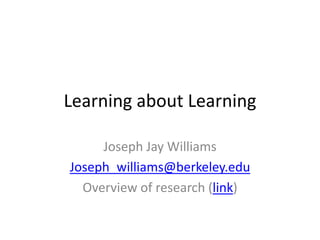Cognitive science research to promote online education
•Descargar como PPTX, PDF•
2 recomendaciones•779 vistas
Denunciar
Compartir
Denunciar
Compartir

Recomendados
Recomendados
Más contenido relacionado
Más de Joseph Jay Williams
Más de Joseph Jay Williams (6)
Using Experiments and Cognitive Science Research to Improve the Design of Onl...

Using Experiments and Cognitive Science Research to Improve the Design of Onl...
Doing online learning research with both scientific and financial value

Doing online learning research with both scientific and financial value
How can Cognitive Science improve Online Learning & Education?

How can Cognitive Science improve Online Learning & Education?
Joseph Williams – Bloomsburg Corporate Advisory Council Meeting

Joseph Williams – Bloomsburg Corporate Advisory Council Meeting
Explanation & learning slides (talk @ pittsburgh science of learning center)

Explanation & learning slides (talk @ pittsburgh science of learning center)
Último
Último (20)
Micro-Scholarship, What it is, How can it help me.pdf

Micro-Scholarship, What it is, How can it help me.pdf
Fostering Friendships - Enhancing Social Bonds in the Classroom

Fostering Friendships - Enhancing Social Bonds in the Classroom
Unit-IV; Professional Sales Representative (PSR).pptx

Unit-IV; Professional Sales Representative (PSR).pptx
General Principles of Intellectual Property: Concepts of Intellectual Proper...

General Principles of Intellectual Property: Concepts of Intellectual Proper...
HMCS Max Bernays Pre-Deployment Brief (May 2024).pptx

HMCS Max Bernays Pre-Deployment Brief (May 2024).pptx
Basic Civil Engineering first year Notes- Chapter 4 Building.pptx

Basic Civil Engineering first year Notes- Chapter 4 Building.pptx
Unit-V; Pricing (Pharma Marketing Management).pptx

Unit-V; Pricing (Pharma Marketing Management).pptx
Salient Features of India constitution especially power and functions

Salient Features of India constitution especially power and functions
On National Teacher Day, meet the 2024-25 Kenan Fellows

On National Teacher Day, meet the 2024-25 Kenan Fellows
ICT Role in 21st Century Education & its Challenges.pptx

ICT Role in 21st Century Education & its Challenges.pptx
Kodo Millet PPT made by Ghanshyam bairwa college of Agriculture kumher bhara...

Kodo Millet PPT made by Ghanshyam bairwa college of Agriculture kumher bhara...
Cognitive science research to promote online education
- 1. Learning about Learning Joseph Jay Williams Joseph_williams@berkeley.edu Overview of research (link)
- 2. Goal • In the opinion of X, what’s the best way to learn or teach a topic? – (X is you, a student, a teacher, instructional/curriculum designer, a businessperson) • How would X’s answer change based on being exposed to research from cognitive science & education?
- 3. Overview • Framework: Encourage Transfer Appropriate Processing • Retrieval Practice & Testing Effects • Problem-based learning & case-based reasoning • Analogy & Comparison • Explanation • Research on “behavior change” may be relevant (BJ Fogg’s Behavior Change Model, CBT, habit formation) • Using technology to expand what learners “know”
- 4. Some analogies for how people might think learning works • Bucket model of the • Integrating a webpage mind into the internet • Instructionism • Need to think actively about your learning
- 5. What are the goals for student learning? • Transfer Appropriate Processing • What knowledge do you want students to acquire? – Memory, Understanding, Ability to make predictions & solve problems? – Facts, Procedures, Concepts, Relations between Concepts, Explanations, Causal Relationships? • In what situations will students use the knowledge? • How will the knowledge be integrated with knowledge the students already have? • How will adding this knowledge cause students to have different future thoughts, actions, and behaviors?
- 6. (Retrieval) practice makes perfect • Use what you want them to learn in the contexts you want them to use it in (Karpicke & Blunt, 2011) • Retrieve it and apply it to the context you wanted to: reason about situations & make attributions as well as ponder, recall and apply rather than reread, explain to another person as well as think about it
- 7. Where will they use knowledge? • Problem Based Learning (Hmelo-Silver, 2006) • Case based reasoning (Kolodner, 1997
- 8. How does it relate to what they already know? • What is it that they already “know”? • What would be concrete, powerful analogies? (Gentner, 2010) • Comparison of old & new ideas (Gentner et al, 2003)
- 9. How will the new knowledge change learners’ thoughts & behavior? • Not just giving, but soliciting explanations (Chi, 2000; Siegler, 2005; Wellman & Liu, 2006; Chouinard, 2008) • Kinds of explanations? E.g. Asking questions vs. Understanding vs. Explaining why • Explain to a friend • Explain why a fact • Explain why a learning strategy is helpful/unhelpful • Explain how what was learned applies to specific cases • Explain how what was learned could be used in future situations
- 10. Synergy between learning and behavior change • Need to link responses and knowledge to specific and distinct cues & situations • In addition to having knowledge, the habit of using that knowledge at the right moment • Environmental support • Technological support: – Daily logging – Text messaging – Interactive programs – Games
- 11. Use technology to expand what learners’ “know”: what they can readily access & apply • “Knowing” by being skilled at finding information – Google, Wikipedia, WikiHow, Lifehacker, Google Scholar • “Knowing” by being aware of who to ask • “Remembering” by storing, organizing, and regularly accessing a personal knowledge base or “electronic brain” – (Google Docs, Evernote, Mendeley) • “Remembering” steps for learning/problem- solving by creating & regularly using apps, checklists and step-by-step guides
Notas del editor
- Vast number of potentially relevant contexts a mindset can be applied, may rely on different domains of knowledge: it’s less like learning math or biology and more like changing “problem-solving ability”, learning CBT, interpersonal skills, nutrition habits
